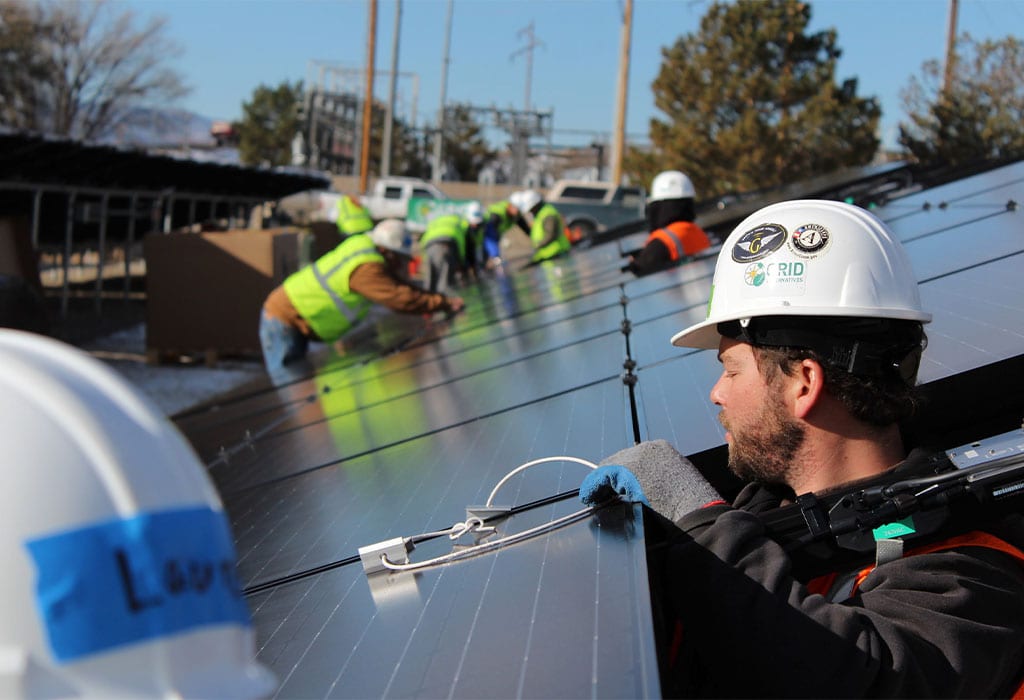Thirteen years ago, Luis Reyes, CEO of Kit Carson Electric Cooperative in Taos, N.M., received an ultimatum from the co-op’s electricity provider, Tri-State Generation and Transmission Association. We’re doubling down on coal, Tri-State told him. We want to build a new coal-fired power plant. Extend your contract to help us pay for it.
Excuse me? Reyes thought. Why should his co-op spend another 10 years paying for an expensive, dirty form of energy of which its members disapproved?
The seed of rebellion had been planted. And each time Tri-State issued another distant, tyrannical edict endorsing fossil fuels, each time it raised its rates, each time it quashed Kit Carson’s inquiries about renewables, that seed flourished.
No more, Kit Carson said. We’re out.
It’s a story being retold all across the west.
The Rise and Fall of Tri-State
Tri-State Generation and Transmission Association supplies wholesale power, at cost, to 43 member co-ops in Colorado, Nebraska, New Mexico, and Wyoming. The majority of these co-ops are located in rural areas. Collectively, they serve around 600,000 people.
At its inception in 1952, Tri-State was a lifeline for rural communities that lacked the capital necessary to build expensive power plants and energy transmission infrastructure. Tri-State footed the cost of construction, transmission, and maintenance. It built massive, coal-fired power plants and invested in coal mines, electrifying isolated towns across the West.
In the ensuing decades, however, much has shifted. Renewable energy is cheaper and more easily accessible than ever before. It no longer needs to be centralized in the form of a power plant—not when you can build a solar array anywhere there’s sun, or a wind turbine anywhere there’s wind. Public opinion has altered, too: now that people realize each megawatt of coal-fired energy is another assault on our fragile planet, they’re far less likely to support it.
Yet as the times have changed, Tri-State has not changed with them. And that’s becoming a real issue for the co-ops who purchase their power from it.
The Costs of Obsolescence
A whopping 70 percent of the power Tri-State provides its co-ops still comes from fossil fuels. It maintains ownership in six coal-fired power plants and either owns or is invested in five active coal mines. It’s even trying to build another new mine in Colorado in the near future. As the price of coal continues to rise, operating these plants and mines becomes a more and more expensive proposition—and the cost falls on the shoulders of the co-ops purchasing their power from Tri-State.
To add insult to injury Tri-State’s restrictive contracts, many of which extend out to 2040 or 2050, lock co-ops into purchasing 95 percent of their power from it. That means co-ops can’t even attempt to offset rising costs by purchasing local affordable, renewable energy, because they can’t go above that paltry five percent. Moreover, with its member co-ops over a barrel, Tri-State itself has next to no incentive to invest in renewables.
As a foe, Tri-State is formidable, but a hunger for justice and a thirst for energy freedom can be even more so. Across the West, member co-ops are stepping up to break their contracts with Tri-State and secure clean, affordable, local, renewable energy. Here are some of their stories.
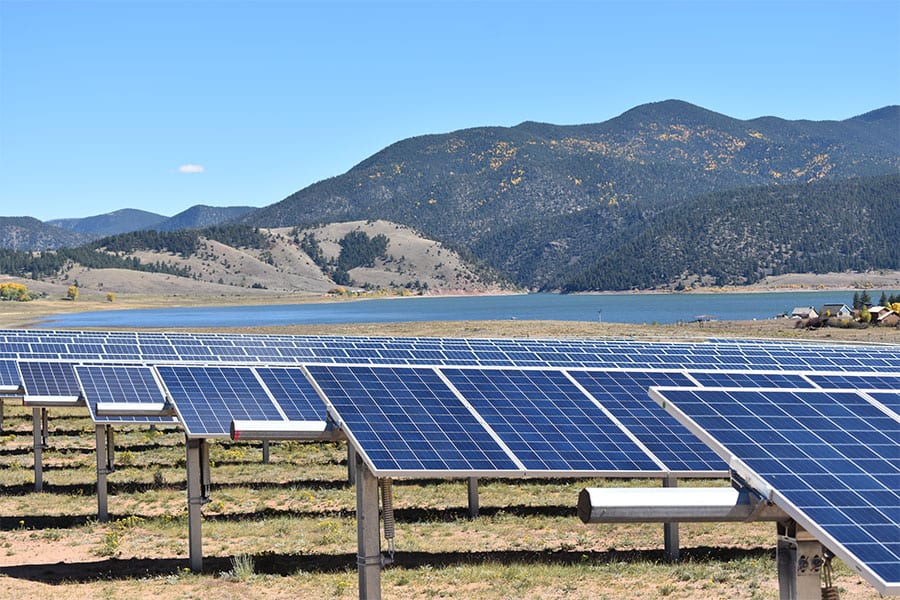
Free of Tri-State’s cap on renewable energy, New Mexico’s Kit Carson Electric Cooperative has invested in solar arrays. Its goal is 100 percent daytime solar by 2022. Photo credit: Kit Carson Electric Cooperative
The Pioneer
Name: Kit Carson Electric Cooperative
Location: North-central New Mexico, six municipalities, including Taos, and two Pueblos
Number of people served: 23,000
In 2016, New Mexico’s Kit Carson Electric Cooperative became the first member co-op to break its contract with Tri-State. More than two years later, one thing is clear: “in this case, the grass is greener on the other side,” said Luis Reyes, Kit Carson’s CEO and General Manager.
Rebellion was fomenting at Kit Carson as far back as 2006, when Tri-State attempted to pressure it to extend its contract in order to finance the construction of a new coal-fired power plant. When Kit Carson balked, Tri-State threatened it with punitive policies. Tri-State also stonewalled Kit Carson when the co-op inquired about raising the five percent renewable energy allowance. And then there were the rate increases—Reyes estimates 10 in 12 years, and none of them justified.
“We said, ‘these guys are never going to change. The world is going to pass us by. We’re going to lose a lot of opportunities. So we decided, let’s go on our own. If we fail, then it’s on us. If we succeed, maybe we create a model for other co-ops,” he said. “Sometimes there are bridges you want to burn so that you never look back (or never think about going back). That was one of those situations.”
By 2008, Kit Carson was asking Tri-State to quote it an exit fee for escaping its contract. Tri-State came back with a number so high that the co-op didn’t ask again for six years. Finally, Kit Carson and Tri-State negotiated a number—$37 million—and Kit Carson was free to pursue its own cheap, local, renewable energy.
Today it’s not Tri-State, but Guzman Renewable Energy Partners that provides electricity to Kit Carson. After Kit Carson has recouped the costs of its exit from Tri-State, Guzman plans to drastically slash the prices it pays for electricity. Guzman can afford to do this because, unlike Tri-State, it focuses heavily on renewables and does not own power generation or transmission facilities.
Free of Tri-State’s draconian five percent renewable cap, Kit Carson has invested in solar arrays and battery storage. The co-op is striving for 100 percent daytime solar by 2022, meaning that solar energy will supply 100 percent if its electricity needs during the day. Its ultimate goal is to become entirely carbon-free, and it plans to start deploying electric vehicle charging stations next year.
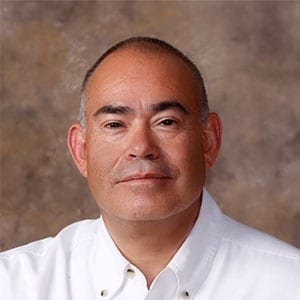
Luis Reyes is Kit Carson Electric Cooperative’s CEO and General Manager.
Post-Tri State, Reyes has discovered that clean energy isn’t just a money saver and a climate protector. It’s also a community builder.
Take Kit Carson’s distributed solar project, which it has broken down into one- to three-megawatt increments so “each community, in essence, has their own solar,” that members of that community see every day, Reyes said. There’s even an array on a Chevron brownfield site, so, in a stirring turn of events, land once poisoned by the oil and gas industry now plays host to solar panels that directly power nearby low- and moderate-income housing.
Reyes is constantly brainstorming new ways to leverage Kit Carson’s energy initiatives into ways that will give back to the community. If Kit Carson goes 100 percent carbon-free, for instance, could Taos’s ski resort parlay its renewable-energy-driven lifts and electric vehicle-friendly surroundings into more customers?
“All of a sudden, our members have tools to make their businesses stronger,” Reyes said.
Regardless of how many co-ops leave Tri-State and when they do so, Reyes insists that renewable energy isn’t a flash in the pan. Since he became Kit Carson’s CEO and General Manager in 1993, he’s seen firsthand the way the energy conversation has shifted.
“The old model is that you fight your members from doing anything on their side of the meter. Now the discussion is, how do we embrace renewables?” he said. “Now, there’s a true dialogue of what’s in the best interests of the members.”
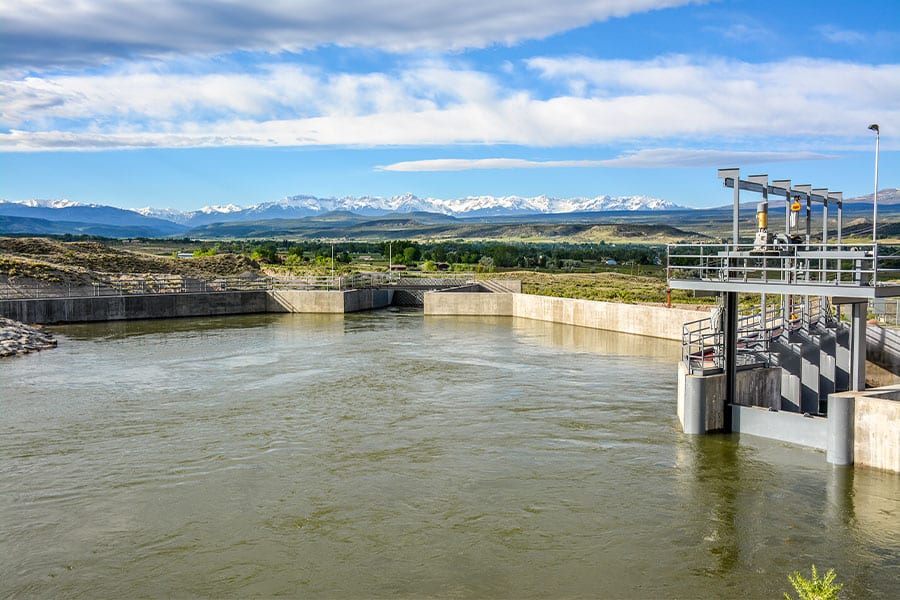
A hydropower station at the Delta-Montrose Electric Association. The co-op plans to expand its investment in renewable energy once it exits Tri-State. Photo credit: Delta-Montrose Electric Association
The Fighter
Name: Delta-Montrose Electric Association
Location: Western Colorado
Number of people served: 27,000
For evidence of just how grueling the process of breaking up with Tri-State can be, one need only look to Delta-Montrose Electric Association (DMEA). The western Colorado co-op voted not to extend its contract with Tri-State more than 10 years ago.
The reason for DMEA’s exit from Tri-State is much the same as Kit Carson’s: a radically different vision for energy production that relies on local generation, while also meeting consumer demands for cleaner and cheaper energy.
“We just have felt for years that we were running into a brick wall, that we were not able to make the changes we were looking for,” said DMEA board member Tony Prendergast. “It’s been a long, frustrating experience.”
With Tri-State unwilling to negotiate a fair exit fee, Delta-Montrose appealed to the Colorado Public Utilities Commission (PUC) to decide the matter, embroiling the co-op in an as-yet-unconcluded legal battle. Tri-State argues that the PUC doesn’t have jurisdiction over the case. Some of its member co-ops agree, convinced their rates will rise if DMEA leaves (in response, Prendergast stresses that the “fair” in fair exit fee means fair to these other co-ops as well.) On the other hand, an increasing number of Colorado legislators say the PUC does have jurisdiction, and they are urging it to intervene.

Tony Prendergast is a board member of Delta-Monrose Electric Association.
“We have all our local legislators supporting it, as well as lots of other legislators throughout the state of Colorado, including several legislators who have other Tri-State co-ops in their districts. That really says a lot about where the public sentiment is,” Prendergast said. “All of us are wanting more flexibility, more freedom, and opportunity to develop available resources. It just doesn’t make sense to people why a utility wouldn’t let us do that.”
It’s not just legislators who are on board with DMEA’s new direction. The co-op’s members are equally supportive. Last fall, DMEA changed its articles of incorporation in the hopes of issuing stock and potentially raising capital to pay the Tri-State exit fee. When membership voted on the change, the vote was 68 percent affirmative, with “surprisingly good participation for such an arcane matter,” Prendergast said. “We took that as a very direct sign from our membership that they were supporting our move to exit Tri-State.”
Though its exit fee will remain undetermined until the PUC situation is resolved, DMEA is already in talks with Guzman Energy, Kit Carson’s electricity provider. Large- and small-scale solar is on the table, but Prendergast is most excited about harnessing the hydropower potential of the agricultural area where DMEA is based. Then not only could the co-op harness water coming off the mountains to generate power, but farmers in the area could also use the income from that hydropower to maintain and improve their canals.
And so, 10 years in, DMEA stubbornly and bravely refuses to abandon its fight for energy freedom. As for Tri-State, its reputation as the enemy of energy freedom is growing. To Prendergast, it’s “an anachronistic model trying to survive without changing. I just don’t think that’s the way of the future.”
The Rabble Rousers
Names: Becky Henderson and Kate Ellard
Location: Poudre Valley Rural Electric Association (PVREA) in northern Colorado
Number of people served: 42,000
When it comes to confronting Tri-State in one’s own backyard, Becky Henderson and Kate Ellard’s advice is simple: just show up.
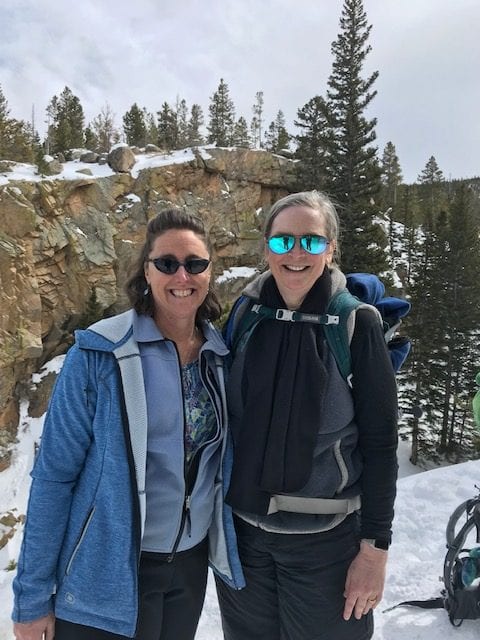
Kate Ellard (left) and Becky Henderson are challenging Tri-State in their own backyard.
Henderson, a 58-year-old retired music professor, and Ellard, a 52-year-old mother and counselor, decided to become more active advocates of local, renewable energy after the 2016 election. Already a Guardians supporter, Henderson reached out to Climate + Energy Program Director Jeremy Nichols for more information on energy in her community. Fortuitously, she just so happened to be a member of a co-op perfectly poised to deal Tri-State a glancing blow.
Henderson’s co-op, the Poudre Valley Rural Electric Association (PVREA) is Tri-State’s second-highest revenue generating member—a very important customer. While PVREA has made some steps toward challenging Tri-State—in September, it passed a resolution asking Tri-State to examine whether adjusting its power sources could lower costs—it has yet to make a definitive move toward breaking with the utility, or even toward supporting other co-ops making the break.
Mere weeks after contacting Nichols, Henderson and Ellard found themselves at a PVREA board meeting. Aside from a journalist and a friend they’d brought along for solidarity, they were the only members of the public at the meeting. Nor did this appear to be much out of the ordinary.
“It seemed to me they were very unaccustomed to having members of the public at the meeting. It dawned on me how many decades this board has been working in private, in an insular way,” Ellard said.
Henderson read a short statement asking PVREA to support Colorado’s Delta-Montrose Electric Association in its efforts to leave Tri-State and urging the co-op to reconsider its Tri-State contract. Post-board meeting, she and Ellard drafted a follow-up letter to the board. They intend to collect other PVREA members’ signatures on the letter. Later, they also plan to set up a meeting with PVREA’s CEO. And, of course, they will attend more board meetings.
Ellard and Henderson emphasize just how accessible their form of activism could be to any member of a Tri-State co-op who wants to join the fight against Tri-State at the community level.
“Showing up at a board meeting with a couple of people would be really powerful,” Ellard said. “Also, hook into organizations like WildEarth Guardians or others near you. It really helped us to get all the facts from someone like Jeremy.”
Knowing—and caring—about the issues can be enough to knock a staid board off-balance, Henderson added: “they’re not used to having people pay attention.”
Thanks to rabble rousers like Henderson and Ellard, the spotlight on renewable energy is shining brighter than ever. They may have a long road (and many board meetings) ahead of them, but the struggles and successes of co-ops like Kit Carson and DMEA have paved the way for a renewable energy future well within their grasp.
Guardians versus Tri-State
What Guardians is doing to secure energy freedom for rural co-ops in the American West and overthrow the tyrannical rule of Tri-State
- Be a thorn in the supply-side. Guardians wields the law to shut down the coal mines and coal-fired power plants Tri-State depends on for generating energy. As part of a settlement with Guardians, Tri-State has already promised to shutter its Nucla Station coal mine and plant in Nucla, Colo., by 2022. It will also close a unit at its Craig Station coal plant in Craig, Colo.
- Empower member co-ops. Guardians educates supporters in Tri-State’s member co-ops about how to change those co-ops from the bottom up (see: Becky Henderson and Kate Ellard’s story in this feature). Guardians also works across co-ops to bridge the isolation of their rural locations, and to connect likeminded groups seeking clean energy solutions.
- Push for regulation. Because Tri-State has been unregulated, its Securities and Exchange Commission (SEC) rating is far more favorable than it should be. Guardians plans to file a complaint with the SEC with the intent of securing a lower rating for Tri-State. With the Colorado Public Utilities Commission’s recent decision to assert jurisdiction over Tri-State, Guardians believes the SEC should reconsider Tri-State’s rating and lower it appropriately. With a lower rating, Tri-State will have more trouble acquiring the investors and capital it badly needs, forcing it to pursue change and move away from its coal investments.
- Call for investigation. Guardians filed complaints with four state utility commissions calling for them to investigate Tri-State’s electricity rates. Tri-State depends on its exorbitant rates to recoup the costs of coal. These commissions have the ability to determine whether Tri-State’s wholesale rates and charges are “just and reasonable.”
